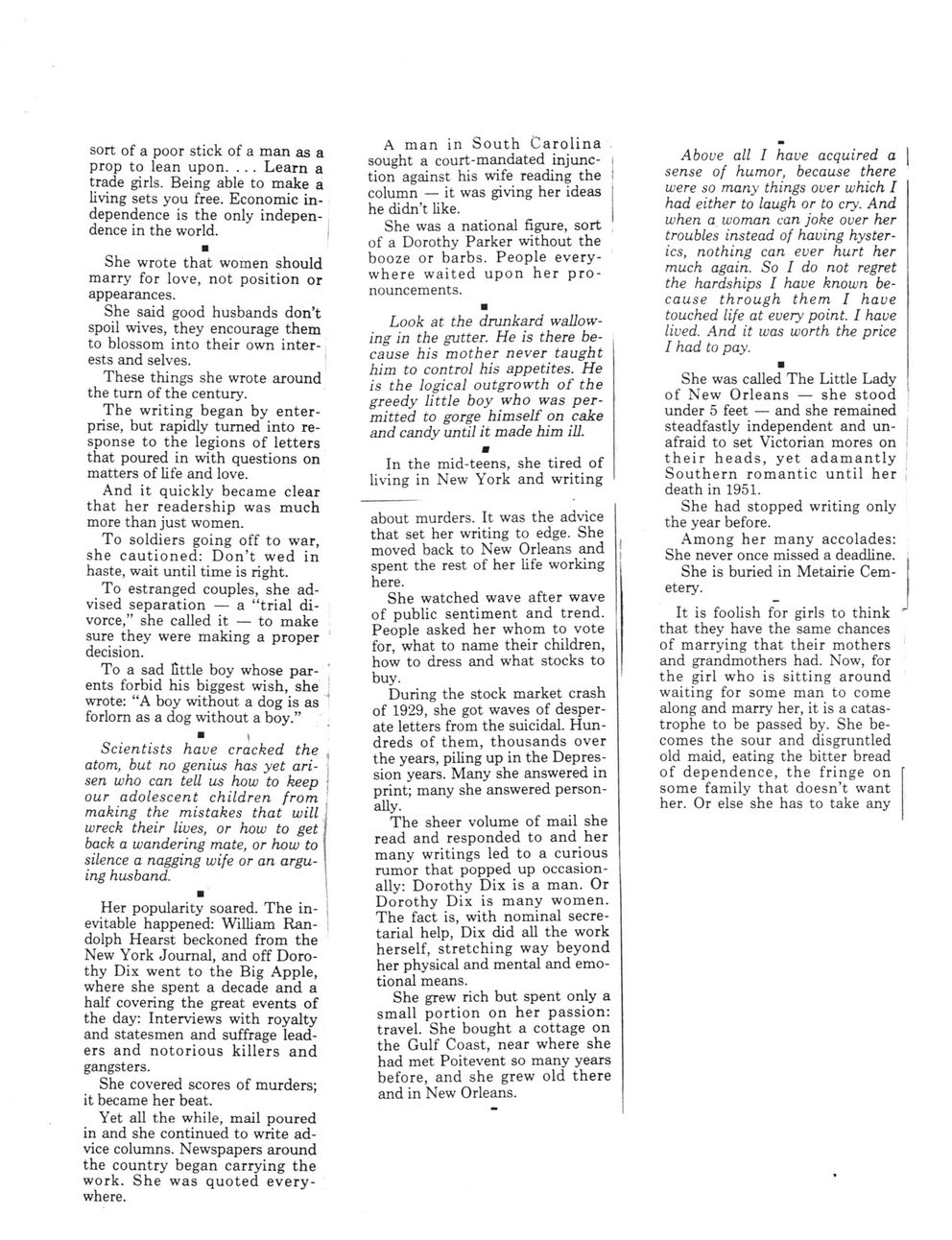This text was obtained via automated optical character recognition.
It has not been edited and may therefore contain several errors.
sort of a poor stick of a man as a prop to lean upon. . .. Learn a trade girls. Being able to make a living sets you free. Economic independence is the only independence in the world. ? She wrote that women should marry for love, not position or appearances. She said good husbands don?t spoil wives, they encourage them to blossom into their own interests and selves. These things she wrote around the turn of the century. The writing began by enterprise, but rapidly turned into response to the legions of letters that poured in with questions on matters of life and love. And it quickly became clear that her readership was much more than just women. To soldiers going off to war, she cautioned: Don?t wed in haste, wait until time is right. To estranged couples, she advised separation ? a ?trial divorce,? she called it ? to make sure they were making a proper 5 decision. To a sad little boy whose parents forbid his biggest wish, she ? wrote: ?A boy without a dog is as 4 forlorn as a dog without a boy.? Scientists have cracked the , atom, but no genius has yet arisen who can tell us how to keep our adolescent children from ' making the mistakes that will wreck their lives, or how to get back a wandering mate, or how to silence a nagging wife or an arguing husband. j ? Her popularity soared. The inevitable happened: William Randolph Hearst beckoned from the New York Journal, and off Dorothy Dix went to the Big Apple, where she spent a decade and a half covering the great events of the day: Interviews with royalty and statesmen and suffrage leaders and notorious killers and gangsters. She covered scores of murders; it became her beat. Yet all the while, mail poured in and she continued to write advice columns. Newspapers around the country began carrying the work. She was quoted everywhere. A man in South Carolina sought a court-mandated injunc- i tion against his wife reading the I column ? it was giving her ideas j he didn?t like. j She was a national figure, sort of a Dorothy Parker without the booze or barbs. People everywhere waited upon her pronouncements. ? Look at the drunkard wallowing in the gutter. He is there because his mother never taught him to control his appetites. He is the logical outgrowth of the greedy little boy who was permitted to gorge himself on cake and candy until it made him ill. m In the mid-teens, she tired of living in New York and writing about murders. It was the advice that set her writing to edge. She moved back to New Orleans and spent the rest of her life working here. She watched wave after wave of public sentiment and trend. People asked her whom to vote for, what to name their children, how to dress and what stocks to buy. During the stock market crash of 1929, she got waves of desperate letters from the suicidal. Hundreds of them, thousands over the years, piling up in the Depression years. Many she answered in print; many she answered personally. The sheer volume of mail she read and responded to and her many writings led to a curious rumor that popped up occasionally: Dorothy Dix is a man. Or Dorothy Dix is many women. The fact is, with nominal secretarial help, Dix did all the work herself, stretching way beyond her physical and mental and emotional means. She grew rich but spent only a small portion on her passion: travel. She bought a cottage on the Gulf Coast, near where she had met Poitevent so many years before, and she grew old there and in New Orleans. Above all I have acquired a | sense of humor, because there were so many things over which I had either to laugh or to cry. And when a woman can joke over her troubles instead of having hysterics, nothing can ever hurt her much again. So I do not regret the hardships I have known because through them I have touched life at every point. I have lived. And it was worth the price I had to pay. ? She was called The Little Lady of New Orleans ? she stood under 5 feet ? and she remained steadfastly independent and unafraid to set Victorian mores on their heads, yet adamantly ! Southern romantic until her death in 1951. She had stopped writing only the year before. Among her many accolades: She never once missed a deadline. . She is buried in Metairie Cemetery. It is foolish for girls to think " that they have the same chances of marrying that their mothers and grandmothers had. Now, for the girl who is sitting around waiting for some man to come along and marry her, it is a catastrophe to be passed by. She becomes the sour and disgruntled old maid, eating the bitter bread of dependence, the fringe on some family that doesn?t want her. Or else she has to take any

Dix, Dorothy 004